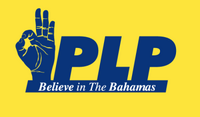Social:Progressive Liberal Party
Progressive Liberal Party | |
|---|---|
| Abbreviation | PLP |
| Party Leader | Philip "Brave" Davis |
| Deputy Leader | Chester Cooper |
| Founded | 1953 |
| Headquarters | Farrington Road, N. 547 P.O. Box, Nassau |
| Youth wing | Progressive Young Liberals |
| Ideology | Social liberalism Progressivism Left-wing nationalism |
| Political position | Centre-left |
| International affiliation | None |
| Colours | Gold and Dark blue |
| Slogan | "Forward Together Bahamians" |
| House of Assembly | 4 / 39 |
| Senate | 4 / 16 |
| Party flag | |
 | |
| Website | |
| www | |
The Progressive Liberal Party (abbreviated PLP) is a populist and social liberal party in the Bahamas. The PLP lies on the centre-left of the political spectrum. Philip "Brave" Davis is the leader of the party after Perry Christie lost his bid for re-election as a representative in the 2017 election.
History
The PLP was founded in 1953 by William Cartwright, Cyril Stevenson, and Henry Milton Taylor.[1][2] The PLP was the first national political party in the Bahamas.[1]
The party governed for 30 years, from 1967 to 1992 and again from 2002 to 2007. Leading the party to its first victory in 1967 was Lynden Pindling, the country's first Prime Minister. The party nationalized some private businesses due to socialist tendencies.
Perry Christie was Prime Minister of the Bahamas between May 2, 2002 and the 2007 general elections when the party was defeated by the rival Free National Movement (FNM) which won 23 seats. The FNM installed leader Hubert Ingraham as the Prime Minister. After defeat and one of its MPs leaving the party since, the PLP held 17 of the 41 seats in the Bahamas National Assembly.
In the 2012 general election,[3] the Progressive Liberals won a solid majority in a landslide election victory, taking 29 of the 38 seats in parliament.[4] Christie was sworn into office on 8 May 2012.[4]
Hubert Ingraham announced his retirement from politics following the defeat of his party.[4] This was the first general election in which the Democratic National Alliance, a third party offered a full slate of candidates along with the two major parties;[5] however, the DNA lost the only seat it held in the prior parliament (that of Branville McCartney, its founder and only MP) and elected no candidates. Elections in the Bahamas take place in the framework of a parliamentary democracy, which relies on the first-past-the-post system of voting.
Electoral results
| Election | Votes | % | Seats | +/– | Position | Government |
|---|---|---|---|---|---|---|
| 1962 | 32,261 | 43.9 | 8 / 33
|
Opposition | ||
| 1967 | 19,408 | 45.0 | 18 / 38
|
Minority | ||
| 1968 | 29,156 | 62.8 | 29 / 38
|
Majority | ||
| 1972 | 28,599 | 57.9 | 29 / 38
|
Majority | ||
| 1977 | 35,090 | 54.7 | 30 / 38
|
Majority | ||
| 1982 | 42,995 | 56.9 | 32 / 43
|
Majority | ||
| 1987 | 48,339 | 53.5 | 31 / 49
|
Majority | ||
| 1992 | 50,258 | 44.7 | 16 / 49
|
Opposition | ||
| 1997 | 49,932 | 41.9 | 5 / 40
|
Opposition | ||
| 2002 | 66,901 | 51.8 | 29 / 40
|
Majority | ||
| 2007 | 64,637 | 47.0 | 18 / 41
|
Opposition | ||
| 2012 | 75,815 | 48.6 | 29 / 38
|
Majority | ||
| 2017 | 59,164 | 37.0 | 4 / 39
|
Opposition |
References
- ↑ 1.0 1.1 Nixon, Celeste (8 June 2012). "PLP Founder Cartwright Dies". Bahamas Tribune. http://www.tribune242.com/news/2012/jun/08/plp-founder-cartwright-dies/. Retrieved 1 July 2012.
- ↑ Jones Jr., Royston (8 June 2012). "PLP Co-founder William Cartwright Dies at 89". Nassau Guardian. http://www.thenassauguardian.com/index.php?option=com_content&view=article&id=31526&Itemid=27. Retrieved 1 July 2012.
- ↑ "Electoral Calendar – international elections world elections". mherrera.org. http://www.mherrera.org/elections.htm. Retrieved 12 May 2011.
- ↑ 4.0 4.1 4.2 Charles, Jacqueline (8 May 2012). "Bahamas swears in new leader as ex-prime minister calls it quits". Miami Herald. http://www.miamiherald.com/2012/05/08/2789999/bahamas-swears-in-new-leader.html. Retrieved 8 May 2012.
- ↑ Popescu, Yasmin. "McCartney and DNA makes political history" , The Freeport News, 25 April 2012.
External links

